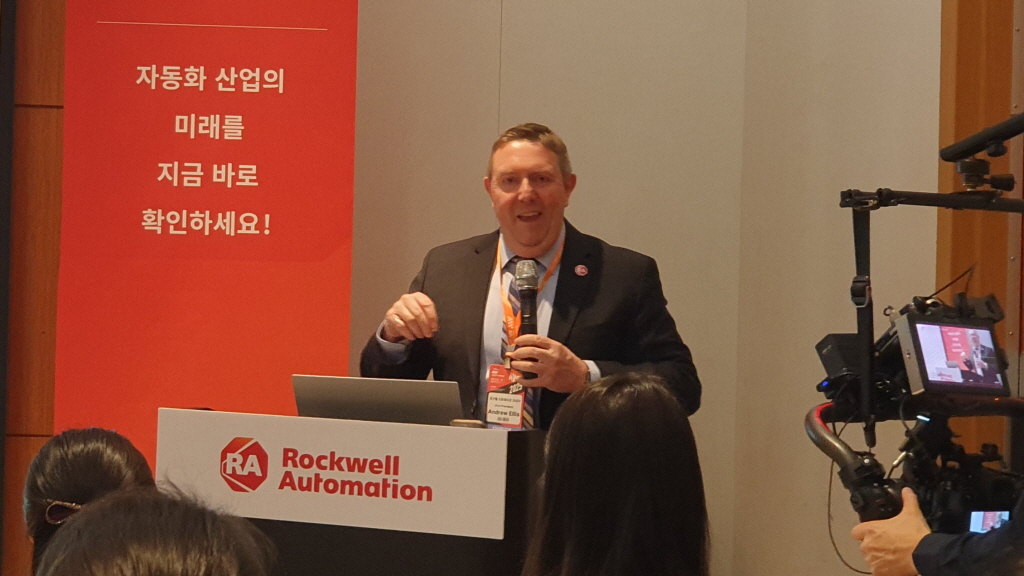세계 최대 산업 자동화 및 디지털 트랜스포메이션 전문기업인 로크웰 오토메이션(Rockwell Automation)이 12일부터 코엑스에서 기자간담회를 개최하고, ‘산업 운영의 미래 창출’이라는 주제로, 인공지능(AI) 및 클라우드 기반의 자율 제조 기술과 다양한 디지털 트랜스포메이션 솔루션을 소개했다. 이날 발표를 담당한 앤드류 엘리스(Andrew Ellis) 로크웰 오토메이션 글로벌 포트폴리오 엔지니어링 부문 부사장은 최근 AI와 스마트 제조의 발전은 기업의 디지털 전환에서 중요한 역할을 하고 있다고 밝혔다.

▲앤드류 엘리스(Andrew Ellis) 로크웰 오토메이션 글로벌 포트폴리오 엔지니어링 부문 부사장이 발표하고 있다.
노동력·전문성 급감, 자동화·AI 도입 중요 해결책 급부상
‘2025 스마트공장·자동화산업전’ 참가, 전문 솔루션 제시
“AI와 스마트 제조의 도입은 성능과 생산성뿐만 아니라 지속가능성, 인재육성, 사이버 보안 측면에서도 매우 중요하다”
세계 최대 산업 자동화 및 디지털 트랜스포메이션 전문기업인 로크웰 오토메이션(Rockwell Automation)이 12일부터 코엑스에서 기자간담회를 개최하고, ‘산업 운영의 미래 창출’이라는 주제로, 인공지능(AI) 및 클라우드 기반의 자율 제조 기술과 다양한 디지털 트랜스포메이션 솔루션을 소개했다.
이날 발표를 담당한 앤드류 엘리스(Andrew Ellis) 로크웰 오토메이션 글로벌 포트폴리오 엔지니어링 부문 부사장은 최근 AI와 스마트 제조의 발전은 기업의 디지털 전환에서 중요한 역할을 하고 있다고 밝혔다.
이어 로크웰오토메이션의 최근 보고서에 따르면, AI와 스마트 제조의 통합은 기업의 핵심적인 요소로 자리 잡고 있다며 디지털 전환을 위해 네 가지 주요 요소를 강조했다.
첫 번째는 고객의 디지털 성숙도에 관계없이 지원을 제공하는 접근 방식으로 고객의 디지털 도입 상태에 따라 다양한 솔루션을 제공하며, 이를 통해 고객의 스마트 제조 목표를 달성할 수 있도록 돕는다.
두 번째는 포괄적인 제품, 솔루션, 서비스 포트폴리오로 다양한 제품과 서비스를 제공함으로써 고객의 다양한 요구를 충족시킬 수 있다.
세 번째는 업계 산업에 대한 도메인 전문성과 기술 전문성을 겸비한 인재다. 도메인 전문가들은 산업 지식과 기술 지식을 결합해 고객에게 최적의 솔루션을 제공한다.
마지막으로, 목표 달성을 위해 생태계 내의 여러 파트너들과 협력해 포괄적인 솔루션을 제공하는 것이다.
이와 함께 로크웰오토메이션의 보고서는 스마트 제조의 5가지 주요 트렌드를 강조했다.
첫 번째는 지속 가능성과 법규 준수로 기업들은 탄소 배출량을 줄이고 에너지 효율성을 높이는 데 중점을 두고 있다.
두 번째는 자율 운영으로 AI와 로봇을 도입해 제조 현장의 유연성을 높이고 원자재 및 완제품을 효율적으로 이동시킬 수 있다.
세 번째는 에지에서 클라우드까지 데이터 관리의 필요성이다. 데이터가 방대해짐에 따라 원격 모니터링과 지원 솔루션을 활용하는 추세가 증가하고 있다.
네 번째는 산업용 AI와 머신러닝으로 이를 통해 설비의 성능을 제고하고 효율성을 최대한으로 끌어올릴 수 있다.
마지막으로 생성형 AI를 도입해 인력의 생산성을 증대시키는 것으로 과거 데이터를 활용해 설계, 운영, 유지보수에 도움을 줄 수 있다.
기술 격차와 인력 부족 문제도 지속적으로 보고되고 있다.
미국의 노동국 자료에 따르면, 매년 270만 명이 퇴직하면서 제조 현장에 200만개의 일자리가 공백 상태로 남아 있다.
이를 극복하기 위해 자동화와 AI 도입이 중요한 해결책으로 떠오르고 있다.
로크웰오토메이션의 설문 결과에 따르면, 고객사의 85%가 AI와 머신러닝을 이미 사용하고 있거나 도입할 계획이라고 응답했다.
이는 성능과 생산성뿐만 아니라 지속가능성과 사이버 보안, 인력 양성을 위한 중요한 투자다.
한편 로크웰 오토메이션(Rockwell Automation)은 3월12일부터 14일까지 코엑스에서 열리는 아시아 최대 규모 스마트 공장 자동화 산업 전문 전시회인 ‘2025 스마트공장·자동화산업전’에 참가한다.
로크웰 오토메이션은 이번 전시회에서 △원활한 생산 및 물류 프로세스 최적화 △AI 기반 설계·운영·유지보수 △스마트팩토리 네트워크 인프라 진단·구축·관리 서비스 관련 솔루션을 선보인다.
주요 전시 품목 중 원활한 생산 및 물류 프로세스 최적화 솔루션으로 제어 패널의 설계를 단순화하고 공간을 최적화하는 On-Machine™ 솔루션과 캐비넷 내부 기기까지 확장되는 커넥티드 엔터프라이즈 솔루션인 'EtherNetIP™ in Cabinet' 데모를 선보일 예정이다.
유연한 생산 전환을 위한 차세대 지능형 트랙 시스템 ‘iTRAK® 5750’과 초고속 정밀 물류 이송의 새로운 제품군인 ‘QuickStick®150’ 등 로크웰 오토메이션의 전통적인 강점으로 손꼽히는 하드웨어 분야의 솔루션도 소개한다.
또한 경량 페이로드(Payload)를 이동할 수 있도록 설계된 강력하고 민첩한 AMR인 ‘OTTO 100’도 선보일 예정이다.
AI 기반 설계·운영·유지보수 솔루션으로는, 다양한 산업군을 위한 제조실행시스템(MES, Manufacturing Execution Systems), 공장 전반에 걸친 제어 및 최적화를 위한 최신 분산 제어 시스템 ‘PlantPAx®’, AI와 클라우드 기반 모듈형 공장 자동화 소프트웨어 ‘FactoryTalk®’ 제품군을 대거 선보인다. 이러한 솔루션들을 제조 현장에서 활용했을 때 어떤 실질적인 효과를 낼 수 있는지 실제 데모를 통해서도 확인할 수 있다.
또한, 스마트팩토리 네트워크 인프라 진단·구축·관리 솔루션도 소개한다. 특히 파트너사인 AI 인프라 및 서비스 전문기업 에스넷시스템(SNET Systems)과 IT/OT 사이버 보안 플랫폼 글로벌 리더 포티넷(Fortinet)의 데모를 현장 부스에서 확인할 수 있다.
이용하 로크웰 오토메이션 코리아 대표는 “국내 제조업체들이 급변하는 시장 환경에서 경쟁력을 갖추려면 AI와 클라우드 기반 솔루션 도입을 통한 스마트 제조 전환이 필수적”이라며 “로크웰 오토메이션은 고객의 성공적인 디지털 전환을 위해 지속적이고 실질적인 지원을 제공할 것”이라고 말했다.
